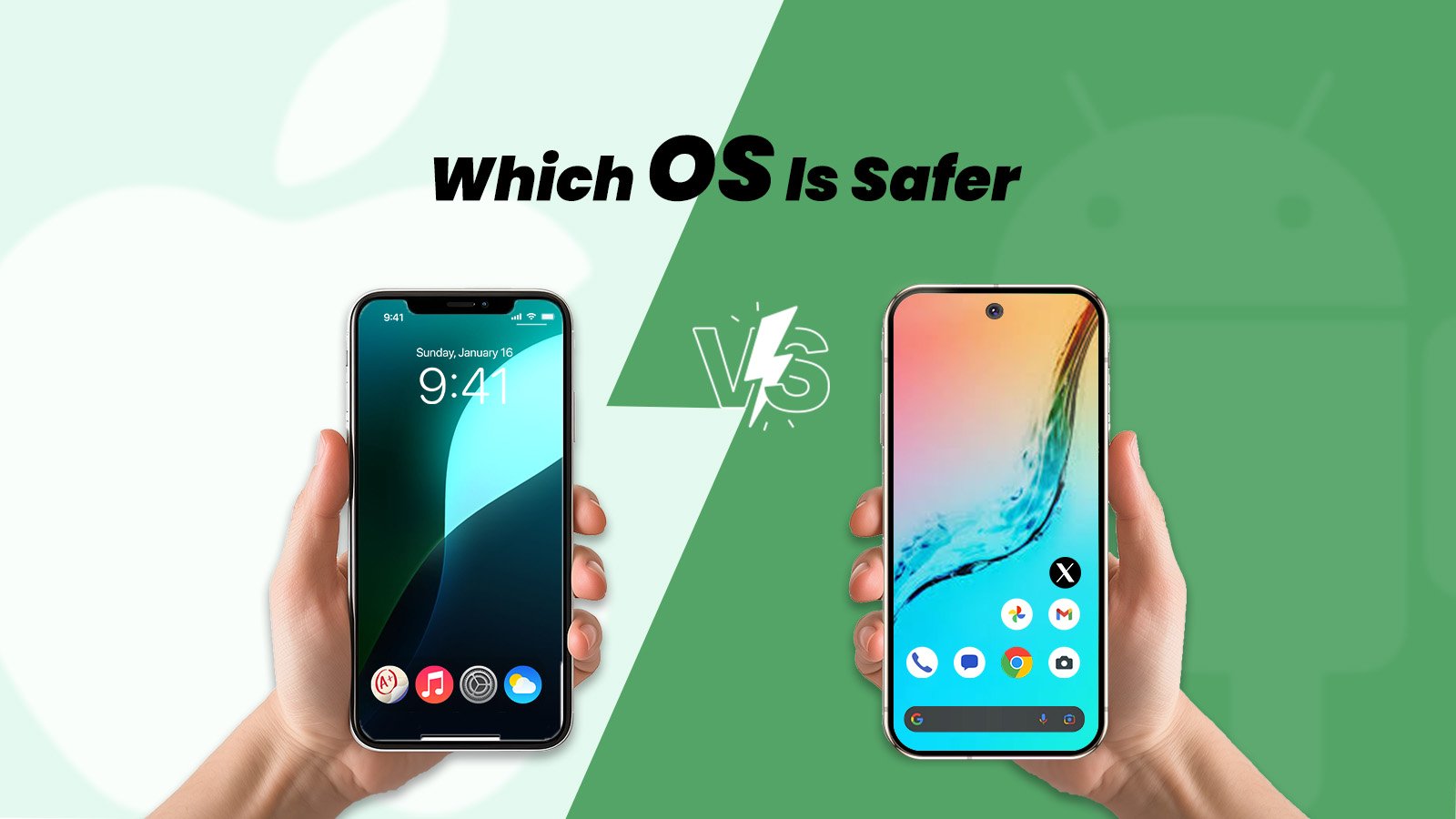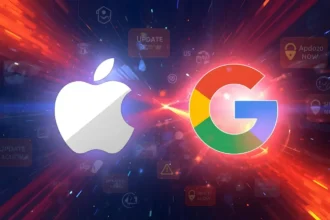iOS and Android are more like neighbors that follow different rules to protect their users’ data. Being strong competitors, both platforms constantly update their systems to protect their users’ data against evolving threats. The debate over iPhone vs Android security in 2025 also continues among users to find the best Operating System (OS) that fits their needs.
Let us have a detailed look at the iPhone vs Android security features, helping you decide which one aligns best with your privacy needs.
iPhone vs Android Security Comparison
iPhone Mobile Security
iOS offers a closed ecosystem, making it hard for hackers to attack and preventing viruses from getting in. The iPhone’s operating system controls the device’s hardware, software, and App Store. Additionally, it offers limited customizations to maintain a secure environment. Such strict security features offer the following benefits to users:
- Strict app screening stops infected mobile applications from accessing users’ devices.
- Limited customization ensures minimal chances of weakening security features.
- The unification of iOS across all iPhone devices simplifies the process of sending security updates and making instant security fixes.
Android Security Features
Android offers greater flexibility to users with regard to operating system features and security settings. Unlike iOS, which is exclusive to iPhones, Android has expanded its operating system across various brands such as Samsung, Xiaomi, and Oppo.
Additionally, it allows downloading from different sources, making the device vulnerable to viruses. To protect users’ data, Android offers some built-in systems such as Play Protect, Verified Boot, and App Permissions. However, the mobile security of Android users depends on the device brand they use.
Moreover, Google is continuously working to improve data protection with smarter tools and faster updates. The following Android features ensure data and device safety for users.
- Google Play Protect automatically scans Android devices and removes harmful applications in real-time.
- Verified boot stops Android devices from starting, if it finds changes in the system software. The feature aims to protect devices from malware or compromised administrative access.
- The latest Android version features a theft detection lock that automatically locks the device on finding the suspicious physical movement.
Device Encryption Comparison
Device encryption is one of the main critical aspects to consider when selecting an OS for device protection. It saves users’ data while restricting others’ access to their devices without permission. Both operating systems, iOS and Android, use different encryption methods, which are:
iOS Encryption
iOS locks every user files in a smart way while combining hardware and software. So, the device requires two secret keys to access data, one from the software and the other from the hardware. This restricts hackers from copying users’ data from another computer or guessing the correct password. iPhone’s operating system controls the encryption in the following ways:
- It saves sensitive information such as Face ID and passwords in a special chip called Secure Enclave.
- The advanced data protection feature in iPhone devices allows users to extend encryption to iCloud.
Android Encryption
Android encryption works in a different way because it must work on different phone brands. Each company has different kinds of hardware, customization needs, and schedules for updates. Therefore, the operating system uses secure zones, strong encryption standards, and smart systems to connect software and hardware. The Android system adopts the following ways to ensure security across all phones:
- Offers File Based Encryption (FBE) as a standard encryption system for all phone brands that use Android’s operating system. It helps device makers manage secret keys and develop methods of locking files.
- Android uses Hardware Abstraction Layers (HAL) that support communication of a mobile device with its different parts.
- Modern Android phones have a secure zone within their chip, Trusted Execution Environment (TEE). It stores passwords and encryption keys for an Android device.
- Google has also shared strict guidelines for all phone brands using Android, called the Compatibility Definition Document (CDD). It especially focuses on encryption and safety rules.
Biometric Security Features
Biometric identification is an essential component of advanced encryption methods and overall security features. Mobile devices inspect physical characteristics of users such as faces or fingerprints to identify them and unlock phones. iPhone and Android biometric systems work differently. Let’s explore the differences:
iOS Biometric Security Features
iOS devices can scan users’ fingerprints with Touch ID, but these are also capable of scanning faces using Face ID. It uses a special infrared light and 3D mapping that allows the device to recognize users’ faces in low light. The features function in the same way if a user wears glasses. Data of users’ faces is not even accessible to Apple, because it is stored in Secure Enclave. The biometric system of Apple devices works in the following ways:
- It enables users to lock mobile applications and photos of their mobile devices.
- iPhone’s software and hardware work together to make biometric features faster, smoother, and more secure.
Android Biometric Security Features
Android also supports fingerprint and face unlock features on smartphones. The functioning of biometric security features like speed and smoothness in Android has a strong relationship with mobile brands. Some Android phones only use a front camera to scan faces and unlock devices. However, phones like Google Pixel and Samsung Galaxy make users’ data more secure with advanced tools. The infrared sensors and depth scanners add more security and increase the speed of biometric features. Modern devices with the latest Android version provide the following benefits to users:
- Scans faces in the low light.
- Builds a 3D map/model by measuring distance between different parts of the user’s face, which prevents bad actors from tricking the device using a picture.
- Sensors work together to verify that the real user is unlocking the device.
Updates and Software Reliability
Regular system updates hold significant value in ensuring security and fixing patches on time. It is like working on your weaknesses in a timely manner before someone else exploits them. Fixing general software glitches improves devices’ performance and makes them more reliable. The criteria for launching new updates on iOS and Android are not the same. Let us discover the difference:
iOS Software Reliability
- A new update goes to all iOS devices at the same time because Apple holds ownership of the software and hardware.
- Updates are valid up to 5 years, even for older phones.
- iOS security fixes are more stable and consistent.
- Faster updates make it harder for hackers to exploit weaknesses.
Android Software Reliability
- Android updates are not for all Android phones. Many devices take time to receive and apply the update.
- For some Android phones only receive updates only for 2 or 3 years.
- Google launched Project Mainline in 2019 with Android 10. The company sends Android updates to the Play Store using it, enabling users to quickly apply fixes.
- Android also uses Google Play Protect to scan applications to detect threats without the need to install the recent update.
iOS 18 Security vs Android 15
iOS 18 strengthens its reputation in the market with App Sandbox that fortifies, which fortifies its security features. It isolates mobile applications, restricting them from sharing data and preventing leaking of users’ data. On the other hand, Android 15 showed improvements by offering enhanced protections with Google Play Protect. Android also features file-based encryption (FBE) and App Sandbox to enhance the data security of each file.
IOS 18 Security Focus
- Prioritizing the security of users’ identity on online platforms.
- Warning users about scams using AI technology.
- Limiting mobile applications from accessing users’ data.
Android 15 Security Focus
- Offering an additional lock for sensitive data such as health and financial information.
- Hiding secret credentials like logins, OTPs, in notifications and screen shares to prevent leaks.
- Detecting scam threats using Google Gemini AI and warning users.
Privacy and Threat Protection
Both platforms are making efforts and continuously advancing their mobile operating systems to ensure users’ security and privacy. The focus is more on remaining safe from online threats. Let’s discuss some powerful features that are especially designed to protect users’ privacy.
iOS Privacy and Threat Protection Features
- App tracking transparency.
- App privacy report.
- Lockdown mode.
- Call recording notices.
- App Sandbox.
- App Store screening.
- Stolen device protection.
Android Privacy and Threat Protection Features
- Private space for sensitive mobile applications.
- Anti-theft features.
- Redacted OTPs.
- Gemini AI security
Long-Term Reliability
Proper understanding of features and their performance helps users make a choice between an Android phone and an iPhone. While both operating systems are designed for reliability and offer longevity, Android’s consistency and longevity vary from one phone brand to another.
iPhone Reliability
- Apple systems are less likely to experience crashes.
- iPhone devices have higher reselling prices.
- Older iPhones get the latest features and security updates.
- However, the battery of iPhone devices gets weaker with time.
Android Reliability
- Cheaper Android phones compromise on performance.
- New updates and features can take even months to reach many users.
- The resale value is lower.
- Some mobile applications are not compatible with all Android devices.
Consider the following points in both operating systems before buying:
To ensure data security in 2025, users must check the following features in the operating systems before buying their phone:
- Ability to set up Two-Factor Authentication (2FA).
- Built-in password manager.
- Consistency in phone updates.
- Avoid third-party app stores.
- Ability to use a reliable VPN on public Wi-Fi without compromising performance.
- Review app permissions frequently.
Data security matters for everyone, so stay informed about the phone features that you choose. At Tech Detour, we make it easy for you to understand tech, so you choose your devices with confidence.




















